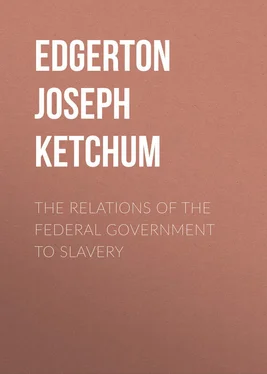Here then, coeval with the organization of the Federal government, was the domestic institution of slavery, existing in all the States but one, and embracing over one sixth of their entire population. There were two very plain methods by which it might have been dealt with. One was by an express declaration of the Constitution, affirming as the Republican sectional party affirm, that slavery is a relic of barbarism, and therefore slavery shall be abolished in all the States and territories of the American Union. Another method was to have declared in the Constitution, as ultra men of the South now declare, that slavery is a benign institution, deserving of protection, encouragement and extension by the Federal government, and therefore slavery shall be protected and extended in all the States and territories of the American Union. Had the constitutional convention been a sectional and not a national organization; had its members been governed by a sectional and not a national spirit, they would doubtless have taken one or the other of the horns of this dilemma, but in that " spirit of amity, mutual deference and concession ," which governed their lofty patriotism, they took neither of the extremes. They took the position that the institution of domestic slavery was of local origin and of local concern – a matter directly pertaining to the internal sovereignty of each State; that it was not a legitimate subject for national or Federal legislation, and so far as related to its extension or its abolition within the States, they left it where they found it, with the people of the States whom it most concerned, the Congress assuming only the right, after the period of twenty years, to prohibit the importations of slaves from beyond the limits of the United States. The political reason of this prohibition is apparent. Without it the principle of non-intervention with slavery by the Federal government which pervades the Constitution, could not have been carried out. So long as the foreign traffic in slaves was made lawful to any of the States, slavery was nationalized. American slave ships, engaged in a lawful commerce, and bearing the national flag, would be as much entitled to national protection as any other of the American mercantile marine. Permission of the African slave trade was essentially intervention in favor of slavery, and the right to prohibit it, and the exercise of that right, in no wise conflict with the principle of non-interference with it within the States.
Конец ознакомительного фрагмента.
Текст предоставлен ООО «ЛитРес».
Прочитайте эту книгу целиком, купив полную легальную версию на ЛитРес.
Безопасно оплатить книгу можно банковской картой Visa, MasterCard, Maestro, со счета мобильного телефона, с платежного терминала, в салоне МТС или Связной, через PayPal, WebMoney, Яндекс.Деньги, QIWI Кошелек, бонусными картами или другим удобным Вам способом.












